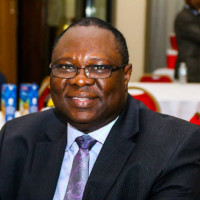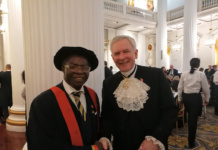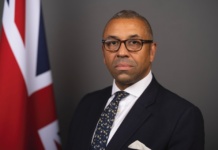Nigerian visitors must “play by the rules”

Britain’s High Commissioner to Nigeria has defended the Home Office’s decision to deport 48 Nigerians from the UK, saying those who refuse to play by the rules cannot simply be ignored.
Paul Arkwright told reporters the UK welcomes Nigerians who wish to do business, study or simply want to experience the country or visit family as tourists, but they must adhere to the terms under which they enter the country and cannot expect to be allowed to stay on illegally.
Mr Arkwright was responding to questions about the widely quoted but misleading news that as many as 500 deportees were due to arrive from the UK on specially chartered planes. The misreported figure should have been “about 50”.
He noted however, that the United Kingdom would not condone Nigerians who are staying illegally any more than it would condone any other national staying illegally. He also criticised “inaccurate” media reporting of how the Home Office deals with over-stayers.
“Today up to 250,000 Nigerians are living legally in the UK, making a significant contribution and adding to the rich fabric of our society. Every year around 130,000 Nigerians visit the UK from Nigeria for both business and leisure. Nigerians, who come to the United Kingdom in accordance with our well-publicised rules will always be welcome guests.
“So it has been disappointing to read, in a few isolated incidents, inaccurate media reporting of the UK’s policy concerning how we return Nigerians back to their home country when they have been present illegally in the UK.
“The UK cannot ignore those who choose not to play by the rules. Like Nigeria, the United Kingdom operates a robust but fair immigration system. The law in the UK is very clear: those who are in the UK illegally and have made the choice not to leave voluntarily will be required to leave.
“Decisions to remove people are not made lightly and we adhere to international obligations – particularly the European Convention on Human Rights – and our own clear domestic law. Decisions made can be appealed and challenged under the scrutiny of an impartial judiciary in court. Fairness and transparency are key. We apply the same rules for Nigerians as we do for any foreign visitor to the UK”.
The 44 men and four women arrived at Murtala Mohammed International Airport, Lagos last weekend accompanied by UK security officials.
An airport source said the deportees complained of the way they were handled by the British authorities, alleging that they were not allowed to take their belongings before being deported. Those alleged to have committed criminal offences were handed over to officers from the Force Criminal Investigation Department (FCID) in Lagos.
Nigeria’s government is coming under increasing pressure to help pave the way for the deportation of an estimated 29,000 Nigerians believed to be living in the UK illegally, according to Olukunle Akindele Bamgbose, acting High Commissioner to the UK.
Mr. Bamgbose gave the indication in his office when he spoke with State House Correspondents covering Vice President Yemi Osinbajo’s visit to London.
He cited ongoing world crises that have given rise to unprecedented levels of migration as motivation for the UK’s stance and gave four conditions that should be met by the Home Office before the Commission could accept the migration and deportation agenda.
“I think about 29,000 Nigerians have been designated to be deported. We are insisting that due process must be followed before Nigerians are really removed from the UK to Nigeria,” he said.
“First, we must ensure that they are really Nigerians; they are medically fit to travel; all the legal processes must have been completed and that they have role to play in Nigeria.
“You do not expect someone who has not been to Nigeria for 30 years to 40 years, and does not have any family and you want to deport him.
“He will constitute social problems to us in Nigeria; so these are the sore points at this moment that we have,” the envoy said.
Mr. Bamgbose said that in spite of the challenge, the relationship between Nigeria and UK had deepened.
“In 2012, trade volume between the two countries was about four billion pounds, which has doubled now. But with what we now have, British investors are ready to move into Nigeria in a massive way.
“I expect that in the next two to three years the trade volume will triple and go to about 12 billion pound or even more.”
Mr. Bamgbose attributed the rise to the new confidence foreign investors have in Nigeria and the new administration.
“The willingness of the British businessmen to even want to come to Nigeria is very important. Because, hitherto, the way we were running the government they did not have that confidence in government. They are not really sure whether they can go into Nigeria and invest.
“Now with the new administration, what they believe the new administration can do and the fidelity with which the new administration has brought to governance that is the first thing.
“You have to have the confidence of those who are going to Nigeria to invest and I think with what is going on now they are very confident that they can go into Nigeria and invest,” he said.
The envoy also said this confidence also elevated the level of diplomatic service of the country.










